COVID-19: Lessons Learned & Another Booster
Tagged:COVID
/
MathInTheNews
/
PharmaAndBiotech
/
Politics
/
Statistics
We would like to think we’ve learned a few things from our collective COVID-19 experience, but the evidence is somewhat equivocal. What we’ve definitely learned is that there will almost certainly be another booster.
Asking your tolerance
Here at Chez Weekend, we’ve just upgraded from an 11 year old (!) Mac to a brand-new one (Macbook pro 16in, M1Max ARM CPU, 64Gb RAM, 2Tb SSD storage). While it’s nice – very nice – things post-migration are nontheless more than a little rough around the edges. “Rough” as in, so far it’s lost all my music and videos, about which I am not happy!
So we beg your tolerance for a few days to weeks while we iron out the kinks.
In the meantime, we have news to think about and a new computer to put through its paces to make sure we have all our ducks in a row, blogging tool-wise.
What have we learned?
So, yeah: what have we learned, if anything? A couple years ago – years ago! – I was asked to say something to our relgious community on what we could learn from “all this” (by which phrase the pandemic was delicately euphemized), as it was then euphemized. Without getting into religious detail, I somewhat mildly observed that I hoped we could perhaps learn:
- A sociopathically self-centered view is both cruel and dooms ourselves and the world around us,
- Compassion is among the cardinal virtues,
- Comforting those in pain is important,
- Aid for the poor, care for the sick, and justice for the oppressed are among the most important ways of exalting each other with atonement and generous forgiveness,
- … and that perhaps those mutual grants of forgiveness could be life-changing.
Let’s see what the punditocracy thinks we’ve learned.
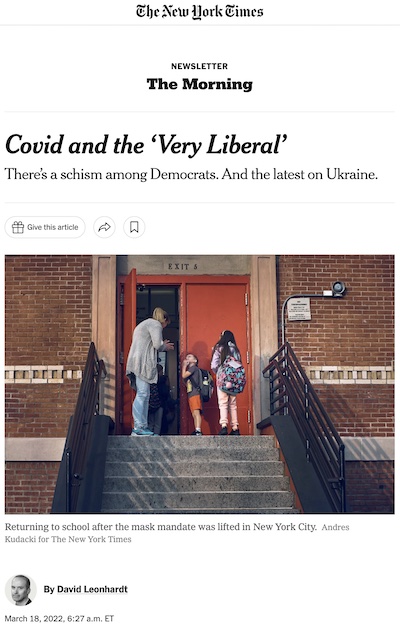
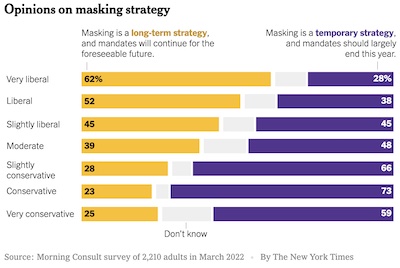 David Leonhardt at the NYT has a few observations on the politial stratification of not
just vaccination, but COVID precautions in general [1]:
David Leonhardt at the NYT has a few observations on the politial stratification of not
just vaccination, but COVID precautions in general [1]:
The key dividing line appears to be ideology. Americans who identify as “very liberal” are much more worried about Covid than Americans who identify as “somewhat liberal” or “liberal.” Increasingly, the very liberal look like outliers on Covid: The merely liberal are sometimes closer to moderates than to the very liberal.
While the difference shows up everywhere, from attitudes about vaccination to whether COVID-19 is even real, it shows up very strongly as shown here in opinions on masking strategy. Conservatives hate masking, almost as much as they hate the rest of us.
Now, to be sure, liberals are turning out a bit like Japanese, where masking is just an ordinary courtesy done on an everyday basis by people who have even a simple cold. The Japanese side of my family simply cannot understand why the American right spits venom over masking. Nor, frankly, can I.
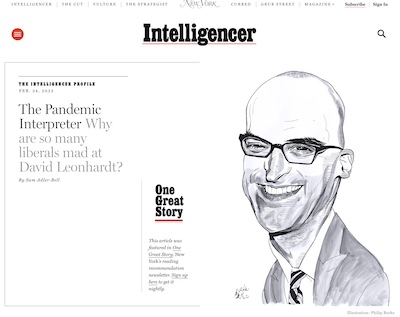 But when Leonhardt begins to appeal for relaxation of COVID-19 precautions, I part
company. I don’t really get on board with economic arguments about the “costs” of
precautions, when the costs of non-precautions are human lives. An easily avoidable
human death is a morally shameful thing over which to argue economics.
But when Leonhardt begins to appeal for relaxation of COVID-19 precautions, I part
company. I don’t really get on board with economic arguments about the “costs” of
precautions, when the costs of non-precautions are human lives. An easily avoidable
human death is a morally shameful thing over which to argue economics.
As Sam Adler-Bell argues in NY Mag [2], anger at Leonhardt is a usual sort of thing among us liberals, and for approximately this reason:
Recently, Leonhardt has used his personal front page to amplify a particular message: that the emergency phase of the COVID pandemic is over and that the persistent degree of anxiety and COVID-mitigation efforts in Blue America are not only ineffectual but doing more harm than good.
It’s that trade-off, where we just indulge in a little bit of human sacrifice for the sake of the moneyed interests, that really hacks me off. A daily death rate of more than 2,000/day is not “time for return to normal”. That is not an acceptable new normal, nor should it be to anyone with any more conscience than a predator. It is, however, a 9/11 event every day. This is not victory over COVID-19, is simple and pointless surrender to be massacred. It is largely a surrender of the lives of the poor and the immunocompromised, especially in the developing nations. This may not afflict affluent consciences… but it should.
It is, in Adler-Bell’s terms, “a self-satisfied state of necro-normalcy in which thousands of lives are disposable”. It sets us up for the next wave, currently hinted at in the cryptic SARS-CoV2 sequences in NYC wastewater, against early surrender:
To be fair: I have to acknowledge, and gratefully, that Leonhardt does often work very hard to be clear, and even pretty hard to find hopeful news, even about COVID-19. I’m just not on board with the rush to normalcy and its required human sacrifices. So Leonhardt is a valuable informant: he tells us the truth as best he knows it on most issues, and on this issue he’s wrong but at least tells us what people on that side are thinking. And does so in clear, engaging prose, which is no small thing.
So, Leonhardt: good job… mostly.
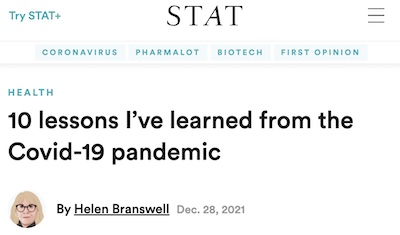 Let’s turn next to the estimable Helen Branswell, writing at STAT News in a 2021
year-end retrospective on what she’d then learned from the COVID-19
pandemic. [3]
Let’s turn next to the estimable Helen Branswell, writing at STAT News in a 2021
year-end retrospective on what she’d then learned from the COVID-19
pandemic. [3]
On the afternoon of New Year’s Eve, just hours from when 2019 was going to segue into 2020, I read an email about some unusual pneumonia cases in China’s Hubei province. Over the past couple of decades, China has been a wellspring of dangerous zoonotic diseases — SARS, H5N1 bird flu, and H7N9 bird flu. Better keep an eye on this, I thought to myself.
Yeah, no kidding. Here’s her top 10 list:
- You gotta act fast. 2020-Jan through Feb was spent denying or failing to grasp what was happening. That was the one chance the world had at control, and we dropped it on the floor. Bad choice. Exponentials move fast, and you don’t get to wait “until the situation clarifies.” (The hell of it is, in the viewpoint from Château Weekend, we keep repeating that mistake at every wave. At least we should make exciting new mistakes, no?)
- Simplicity rules. We got way smarter than was good for us, trying to quantify who qualified as an essential worker, or immunocompromised, or even elderly to be first in line for vaccinations. Policies have to be simple enough to be executed almost without thought, because – sadly – most people will not stop to think. (Or if they do, they’ll just argue while the pandemic rages.) Age strata and health care workers were simple criteria, and could do the job. Again, we repeated this mistake with boosters, because nobody could figure out who was eligible and everybody wanted to argue about it.
- The calculus for kids is just different. Children are not just like adults, only smaller. That’s why we have pediatricians, because they know what else is different. They have different risks for COVID-19, as well as different responses to vaccination. (Don’t get me started about MIS-C caused by COVID-19, but with much higher risk from COVID-19 than any vaccine risk.) Nonetheless, politically and socially, we won’t accept any death rate in children (compared to elders), so any strategy that is executable in the real world must cope with this.
- Even in the face of a deadly pandemic, politics override public health. I hate this fact. It reminds me of reading, many years ago of a US pilot shot down in Viet Nam, captured by the NVA with a broken leg. He was told: “You have a medical problem and a political problem. In this country, we solve political problems first.” That’s evil and stupid on so many levels… but we have political leaders on the right who sound just like that. They adopt policies which, by design, kill their constituents and crate massive economic and social damage. But they persist.
- Most people have no clue how science works. And that’s a problem. See why I like Helen? Our woefully inadequate educational system, unworthy of the most underdeveloped nations, makes Americans think science is like magic rather than an iterative, self-correcting process that converges on the truth by stages. Every time guidance was updated, people claimed science doesn’t work, vaccines don’t work, or the whole world is a conspiracy of gargatuan prorportions and brobdingnagian stupidity.
- Downplaying what lies ahead helps no one. Yup, people correctly call this “lying.” Especially when Trump said COVID-19 will “just disappear”, or was “just the flu”, or any number of other knotheaded things.
- Winning the vaccine race really does matter. So does experience. The Moderna vaccine, given at higher doses, is looking like the better one now. But Pfizer knew more than a little bit about regulatory filing and commercialization, so got out front. Fortunately for everyone, while there may be shades of difference between them, both vaccines are excellent.
- In a pandemic, it’s pretty much every country for itself. This is a terrible thing to realize about oneself, second only to the refusal to recognize it. When Jared Kushner wanted vaccine providers to prioritize the US, he was starting down the road to the Hobbesian war of all against all. Only a terrible person thinks this is a virtue.
- Conducting clinical trials during a pandemic is doable, but it takes coordination. To which I would add: it’s hard even under the best of circumstances, and damn near impossible under pandemic circumstances. I am ever so slightly in awe of the people who could do this. When they speak on this subject, I will shut my mouth, sit down, and listen respectfully. They deserve that, and more. (It would be nice if the US would join the civilized world in having true universal health care with unified electronic medical records so we could do some more of that ourselves, domestically and faster.)
- Americans are willing to put up with a lot of death. Why is that, exactly? And
more to the point, what is wrong with us? We’re going to hit 1 million dead in
the US quite soon, and it’s now about 6 million dead in the rest of the world. Several
daunting facts:
- The US is 4% of the world population, but 16% of the world’s COVID-19 deaths. Why do we tolerate dying at 4x the rate of the rest of the world? Wouldn’t you think that calling for a universal healthcare system like theirs would be a reasoable reaction?
- The true number of COVID-19 deaths is probably 3x that much, based on excess death rates over previous year baselines. So… 3 million dead in the US and 18 million world-wide. That’s a major war’s casualties. Why exactly do we fight against ourselves, again?
- More of those deaths were in 2021, after vaccine availability. We could have saved ourselves, but we would not.
Branswell offers a counterpoint to Leonhardt’s appeal for a return to “necro-normalcy”:
And still, more people died from Covid in 2021 than died from Covid in 2020. In 2021, swaths of the country fought mask mandates, opposed vaccination mandates, objected to any measure designed to slow the spread of Covid that they perceived as an impediment on their ability to resume pre-pandemic activities.
This insistence on returning to life as normal came at an unfathomable cost — the loss of hundreds of thousands of parents, grandparents, great-grandparents. Aunts and great-aunts, uncles, and great uncles. Cousins. Friends. Coworkers and supervisors. And still, big chunks of the population refused to get vaccinated, refused to wear masks, insisted SARS-2 was a hoax, or was no more threatening than the flu.
“It almost is inexplicable,” Anthony Fauci, director of the National Institutes of Allergy and Infectious Diseases, told me when I asked him about this last month.
For me, it is incomprehensible.
Yeah, me too.
It’s like watching Moloch in action: the right senses political points to be made, and sacrifices human lives to get them. And they do it proudly.
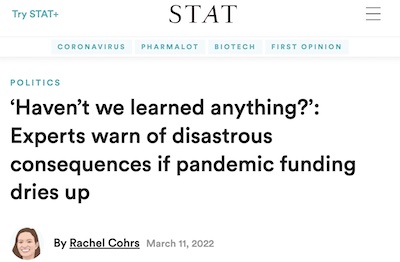 Rachel Cohrs, also writing at the usually-excellent STAT News, has some disturbing
evidence that we are actively refusing to learn from the pandemic. [4]
Rachel Cohrs, also writing at the usually-excellent STAT News, has some disturbing
evidence that we are actively refusing to learn from the pandemic. [4]
Last week, Congress failed to provide additional funding for COVID-19 response, in particular to purchase treatments like monoclonal antibodies and drugs like paxlovid and molnupiravir, and the testing capacity to support using them effectively. Our right wing would prefer political posturing, even though people die as a result.
An analogy:
“It would be going out and purchasing fire trucks the moment the 911 calls come in to the station,” said Michael Osterholm, a prominent epidemiologist at the University of Minnesota and former Covid-19 adviser to President Biden.
…
“To not fully fund these programs, you are playing with an infectious disease fire, and it will burn you. In the process, unfortunately, people will unnecessarily have to die,” Osterholm said.
Yup, it’s really that stupid. Unnecessary death and chaos.
But Eric Topol, the founder and director of the Scripps Research Translational Institute, said there’s also a danger officials will become complacent.
“These legislators are lulled in some type of trance, thinking the pandemic is over. That couldn’t be further from the truth,” Topol said. “Haven’t we learned anything in two years? I’m dismayed and disquieted about this, and I’m hoping that there is going to be some remedy.”
Stronger language than “dismayed” and “disquieted” is called for here, though Topol is as ever being diplomatic. The problem is the right mistakes diplomacy for wishy-washy weakness. It’s apaprently part of the Moloch-driven power-seeking syndrome, or something.
“Failing means people dying, and getting severely ill unnecessarily, and it’s preventable. I wouldn’t be able to sleep at night if I were responsible for that,” Topol said.
I’m sure Republicans sleep just fine. Like, you know, Dracula. And Joe Manchin, for that matter.
Pfizer and Moderna booster applications
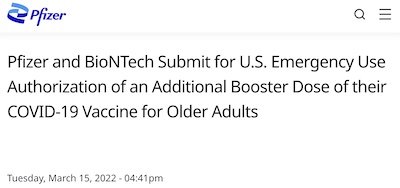
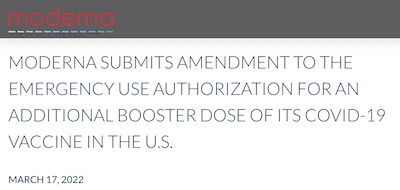

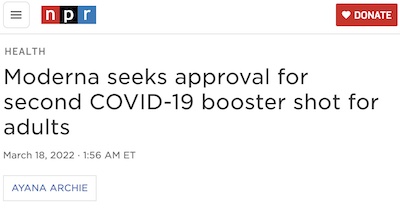
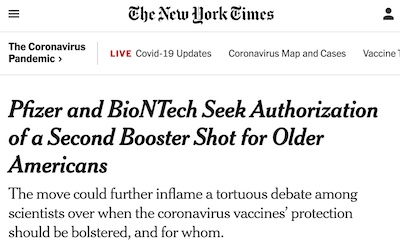

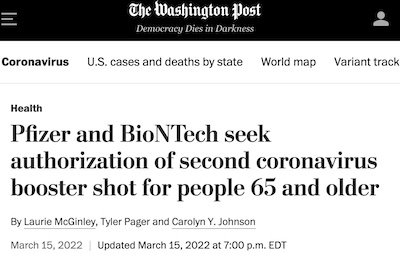
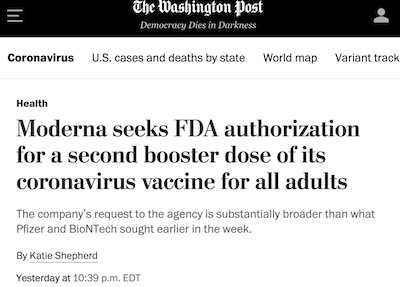 It’s clear we’ve learned some things, though not necessarily the things we’d like to
have learned. Lots of our learning was about our self-inflicted political dysfunction in
the US.
It’s clear we’ve learned some things, though not necessarily the things we’d like to
have learned. Lots of our learning was about our self-inflicted political dysfunction in
the US.
However, we have learned that mRNA vaccines are pretty wonderful! And this week came the good news that both Pfizer/BioNTech [5] and Moderna [6] have filed with the FDA for authorization of another booster. True to its more aggressive past, Moderna filed for all adults while Pfizer filed for seniors over 65.
This news is pretty widely reported in the popular media. For example, just picking some of the more reliable news sources favored by your humble Weekend Editor, there were reports of both on NPR [7] [8], in the New York Times [9], [10], and in the Washington Post. [11], [12]
(Don’t bother with the Twitter comments, which are along the lines of “how many more doses before they’re effective?” You don’t need that kind of sewage pumped at high pressure into your head. Really, you don’t. Nobody needs that.)
 The Pfizer press release in particular, has a nice meaty bibliography to it, reporting on
evidence of vaccine waining in the US [13], the Qatar data
on the duration of protection [14], vaccine efficacy vs
Omicron in particular in the US [15], vaccine efficacy vs
Omicron in the UK [16], a study of efficacy declines vs
Omicron BA.1 vs Omicron BA.2 in England showing waning down to
50% [17] (see table on p. 13, reproduced here), and 2
Israeli studies of the efficacy vs Omicron of a 4th
dose. [18] [19]
The Pfizer press release in particular, has a nice meaty bibliography to it, reporting on
evidence of vaccine waining in the US [13], the Qatar data
on the duration of protection [14], vaccine efficacy vs
Omicron in particular in the US [15], vaccine efficacy vs
Omicron in the UK [16], a study of efficacy declines vs
Omicron BA.1 vs Omicron BA.2 in England showing waning down to
50% [17] (see table on p. 13, reproduced here), and 2
Israeli studies of the efficacy vs Omicron of a 4th
dose. [18] [19]
You may notice an uncomfortable fact about those references: they are mostly from sites outside the United States, in countries that have comprehensive, universal health care for all residents and a unified electronic medical records system. In the US we have neither of those, preferring a balkanized for-profit system continually at war with itself and with patient welfare. We really shoudl get on that one of these days, no?
But let me emphasize: this is based on multiple eal-world datasets, involving real patient populations in the wild, going about their business, mostly in Israel or Qatar. These are not tiny datasets, either: there were N=1.1×106 patients involved in just one of them. Rates of infection were 2x lower, and rates of severe disease were 4x lower.
Another study of health-care workers showed 7x to 8x increases in antibody titers, and an 8x to 10x increase in antibodys specifically to Omicron.
These are statistically significant and show clinically meaningful strength of effect. Respectively, those 2 things mean: (a) you should believe it, and (b) you should do something about it. The “something” here is another booster, and that’s the proposition before the FDA now.
The Moderna press release is significantly briefer, but mentions that it’s also based largely on the Israeli data, which we presume to be the same as the datasets Pfizer so conveniently cited. We’ll look forward to reviewing everybody’s data, if the FDA holds VRBPAC hearings, which are always public.
The FDA advisory committees calendar does not yet have a VRBPAC meeting scheduled for either booster application (as of 2022-Mar-18). But they’ve recently made decisions – for example, approving evusheld – without convening a VRBPAC meeting. So maybe that will happen here? But now you can use the link above to keep an eye on the VRBPAC calendar yourself, as we will be doing here at Chez Weekend.
Either way, if the FDA decides to grant EUA to another booster, the CDC will still have to pass on it. That’s likely, but not guaranteed.
We note, with some faint air of impatience, that Omicron-specific vaccines from both sources are still in trials. While I’m happy – and more than that, really – to take another booster, it’s the Omicron-specific booster that I really want. (At least, until the π variant, or whatever we call it, heaven help us.)
The Weekend Conclusion
Sadly, we’ve failed to learn some important lessons of the pandemic, preferring to learn to tolerate right-wing political posturing and disinformation instead. That’s the bad news.
Happily, we’ve learned to make awesomely high efficacy vaccines, and we’re on course to boost either with the base vaccine or with an Omicron-specific vaccine. That’s the good news.
Notes & References
1: D Leonhardt, “Covid and the ‘Very Liberal’”, New York Times, 2022-Mar-18. ↩
2: S Adler-Bell, “The Pandemic Interpreter: Why are so many liberals mad at David Leonhardt?”, New York Magazine, “The Intelligencer”, 2022-Feb-24. ↩
3: H Branswell, “10 lessons I’ve learned from the Covid-19 pandemic”, STAT News, 2021-Dec-28. ↩
4: R Cohrs, “‘Haven’t we learned anything?’: Experts warn of disastrous consequences if pandemic funding dries up”, STAT News, 2022-Mar-11. ↩
5: Pfizer Media Relations & BioNTech Media Relations, “Pfizer and BioNTech Submit for U.S. Emergency Use Authorization of an Additional Booster Dose of their COVID-19 Vaccine for Older Adults”, Pfizer Press Releases, 2022-Mar-15. ↩
6: C Hussey, “MODERNA SUBMITS AMENDMENT TO THE EMERGENCY USE AUTHORIZATION FOR AN ADDITIONAL BOOSTER DOSE OF ITS COVID-19 VACCINE IN THE U.S.”, Moderna Press Releases, 2022-Mar-17. ↩
7: R Martin & amp; R Stein, “Pfizer-BioNTech seek FDA authorization for 2nd COVID booster for older adults”, NPR, 2022-Mar-16. ↩
8: A Archie, “Moderna seeks approval for second COVID-19 booster shot for adults”, NPR, 2022-Mar-18. ↩
9: S LaFraniere, “Pfizer and BioNTech Seek Authorization of a Second Booster Shot for Older Americans”, New York Times, 2022-Mar-15. ↩
10: S LaFraneire, “Moderna asks the F.D.A. for authorization for a second booster for all adults”, New York Times COVID-19 live updates, 2022-Mar-17. ↩
11: L McGinley, T Pager, & CY Johnson, “Pfizer and BioNTech seek authorization of second coronavirus booster shot for people 65 and older”, Washington Post, 2022-Mar-15. ↩
12: K Shepherd, “Moderna seeks FDA authorization for a second booster dose of its coronavirus vaccine for all adults”, Washington Post, 2022-Mar-17. ↩
13: JM Ferdinands et al., “Waning 2-Dose and 3-Dose Effectiveness of mRNA Vaccines Against COVID-19-Associated Emergency Department and Urgent Care Encounters and Hospitalizations Among Adults During Periods of Delta and Omicron Variant Predominance - VISION Network, 10 States, August 2021-January 2022”, US CDC Morbidity and Mortality Weekly Report 71:7, 155-263, 2022-Feb-18. DOI: 10.15585/mmwr.mm7107e2, PMID: 35176007, PMCID: PMC8853475. ↩
14: H Chemaitelly, et al., “Duration of protection of BNT162b2 and mRNA-1273 COVID-19 vaccines against symptomatic SARS-CoV-2 Omicron infection in Qatar”, medRχiv 2022-Feb-08. DOI: 10.1101/2022.02.07.22270568. ↩
15: SY Tartof, et al., “BNT162b2 (Pfizer–Biontech) mRNA COVID-19 Vaccine Against Omicron-Related Hospital and Emergency Department Admission in a Large US Health System: A Test-Negative Design”, Lancet preprint at SSRN, 2022-Jan-18. DOI: 10.2139/ssrn.4011905. ↩
16: N Andrews, et al., “Covid-19 Vaccine Effectiveness against the Omicron (B.1.1.529) Variant”, New Engl Jnl Med, 2022-Mar-02, Epub ahead of print. DOI: 10.1056/NEJMoa2119451, PMID: 35249272. ↩
17: UK Health Security Agency, “COVID-19 vaccine surveillance report – Week 9, 3 March 2022”, UK Health Security Agency releases, 2022-Mar-03 ↩
18: G Regev-Yochay, et al., “4th Dose COVID mRNA Vaccines’ Immunogenicity and Efficacy Against Omicron VOC”, medRχiv, 2022-Feb-15. DOI: 10.1101/2022.02.15.22270948. ↩
19: YM Bar-On, et al., “Protection by 4th dose of BNT162b2 against Omicron in Israel”, medRχiv, 2022-Feb-01. DOI 10.1101/2022.02.01.22270232 ↩

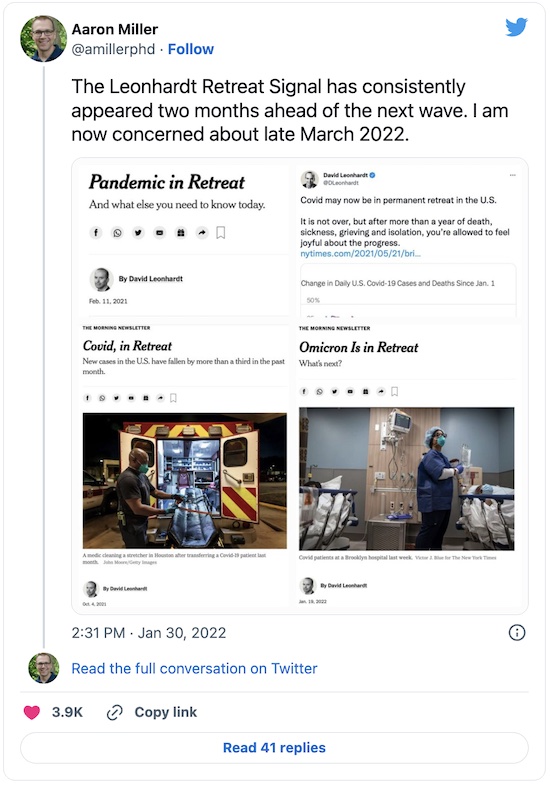
Gestae Commentaria
Comments for this post are closed pending repair of the comment system, but the Email/Twitter/Mastodon icons at page-top always work.